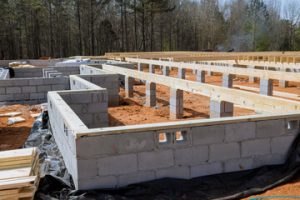Starting a construction project can be a huge endeavor. Project owners must anticipate roadblocks, adapt to complexities, and ensure that the final project meets their vision.

Coen Construction professionals use their skills to build everything from rudimentary shelters to skyscrapers. Throughout the years, construction technology has improved to meet ever-changing needs.
The construction industry contributes to many important projects, including residential buildings and commercial complexes, industrial facilities, infrastructure such as bridges, roads, dams and airports, as well as the utilities that power our homes and businesses. However, the industry is facing a significant challenge in terms of finding and keeping skilled workers. As older employees retire and Gen Z takes the place of previous generations, firms need to find ways to attract younger workers to the field.
The good news is that technological advancements are transforming construction and making it an attractive career option. For example, the use of sensors and connected devices on job sites enhances safety protocols, enables predictive maintenance for vehicles and generators, and improves operational efficiency. Additionally, AI technologies allow for better project management, with software analyzing data and providing a more comprehensive overview of a building’s performance.
In addition, cloud computing is enabling greater flexibility and accessibility of project data, improving communication and collaboration between teams. In the future, smart or intelligent construction (also known as Construction 4.0) will leverage these emerging technologies to increase project efficiency and reduce costs. This new generation of technology includes augmented reality, the Internet of Things, robots and drones, autonomous vehicles and 3D printing.
While these advances have the potential to transform the industry, many developing nations are facing challenges in adopting them. Poor infrastructure, lack of access to funding and limited training are some of the main barriers. Fortunately, there is a growing awareness of the need to invest in these technologies and develop appropriate training programs for professionals.
As a result, the future looks bright for the construction industry. For young people considering a career in this highly valuable sector, it is important to consider education and training options. Earning a degree or certification from an accredited institution such as NMU Global Campus is a solid foundation for entering the construction industry. By studying topics such as construction technology, cost estimates, building codes and regulations, sustainable practices, and communication strategies, students have the skills they need to navigate the complexities of modern construction.
Education and Training
Construction training teaches learners practical skills that can be used across a wide range of professional fields. Whether you work in an office or out in the field, understanding basic construction techniques and building materials can help you perform pragmatic tasks like repairing drywall or replacing light fixtures. Learning about construction techniques can also improve your efficiency in the workplace and give you an edge over competitors.
As the industry continues to innovate, it’s important for construction professionals to stay up-to-date on new technologies and sustainable practices. This knowledge can help you deliver projects more efficiently and ensure compliance with local regulations.
You can learn these skills by enrolling in a construction training program or taking individual courses online. In-person classes are the most immersive and interactive option, allowing you to ask questions in real time as an instructor guides your learning. Online self-paced courses are more flexible and allow you to fit your studies into your daily schedule, though they may require longer commitments than live classes.
Some common construction-related skills include:
Project management skills: Developing and overseeing complex projects, meeting deadlines, managing budgets, and ensuring compliance with building standards and safety regulations.
Engineering and technical skills: University-level training in the fundamentals of engineering and structural design. This includes an understanding of how building materials are sourced, where they’re used, and how each material can be best installed. Construction site safety skills: Adherence to OSHA regulations, a familiarity with construction equipment and tools, and a thorough understanding of how to construct a safe working environment.
Blueprint reading: The ability to read and understand detailed blueprints is a must-have skill on any construction site. Invest in a course bundle from VDCI to learn how to interpret these documents, including training on scale, drawing types, and specifications.
Communication skills: Construction sites are dynamic environments that change on a daily basis, and you’ll need to be able to communicate with your team to resolve issues, identify risks, and keep everyone updated. Take a communications course that emphasizes soft skills like active listening and clear communication, or read industry publications to keep up with new trends.
Skills Needed
Construction workers have to be physically fit enough to handle the labor involved in the trades and keep up with the fast pace of work on building sites. Often, new construction workers are paired with an experienced team member who provides them with on-the-job training as they learn their craft. Those interested in entering the industry can also take courses and enroll in certification programs that teach them the basics of various construction trades before starting on a job site.
In addition to having the right skills for a specific trade, construction workers need strong organizational and project management abilities. These skills are vital to ensure projects stay on track and meet deadlines. They are also necessary to ensure the safety of everyone involved in a project. Construction workers may need to interact with clients and other professionals, so good communication and relationship-building skills are essential.
As the labor shortage continues to plague many industries, efficiency is becoming increasingly important for construction companies. Technology like automation and robotics can help mitigate the impact of a limited workforce by reducing the amount of manual labor needed on a project. This can free up time for skilled workers to focus on more complex tasks.
A good understanding of how to read blueprints is another key skill for construction workers. These technical drawings provide a roadmap for the entire project, detailing where walls should go, how plumbing and electrical systems will run, and how different parts of the structure will connect together. This ability allows construction workers to complete their work quickly and accurately.
Depending on the type of construction, some workers need additional specialized training to complete their jobs. For example, those who want to build industrial buildings need specialized training in how to anticipate industry-specific needs and adhere to strict safety guidelines. Other construction workers may need to undergo extensive training to learn how to safely operate a crane or other heavy machinery.
Although there are many skills that are crucial for construction workers, the most important is a willingness to learn and progress in the field. This industry is always changing, and it is important for construction workers to be flexible and adaptable in order to succeed.
Work Environment
The work environment is made up of many components that can affect the quality of the work. This includes the physical condition of the office, communication between team members and overall company culture. Having a positive work environment will help to increase productivity, motivation and commitment to the job.
It will also ensure that all employees have a sense of purpose and belonging. Having an open dialogue about the current work environment can help to identify areas that need improvement. This can be done through surveys, focus groups and open conversations. Using inclusive language that encourages different perspectives is key to building a supportive work environment.

